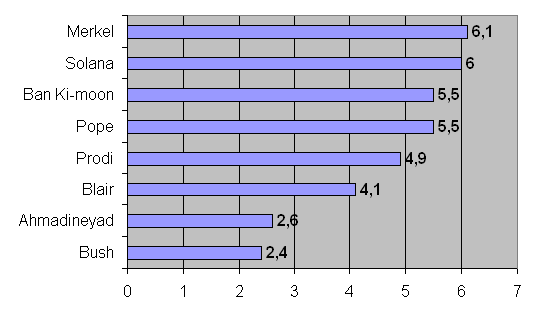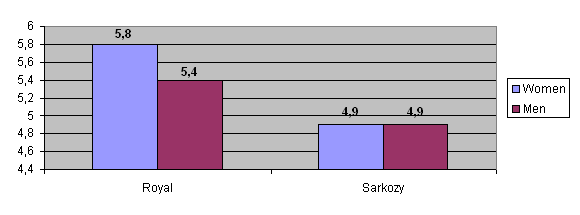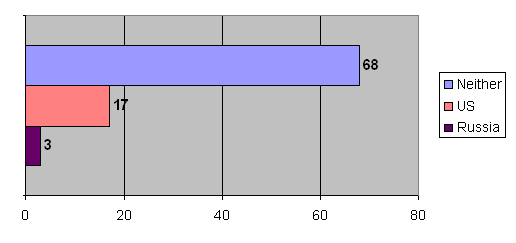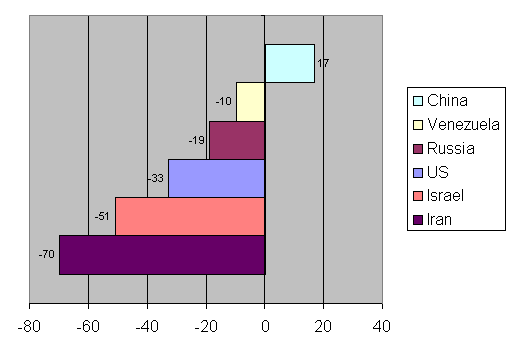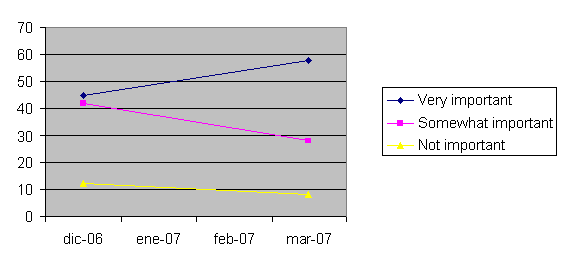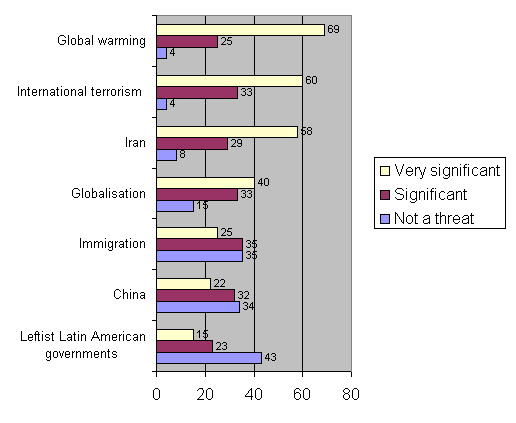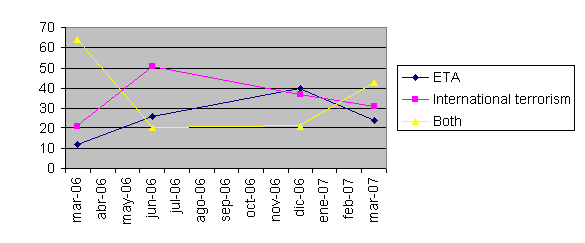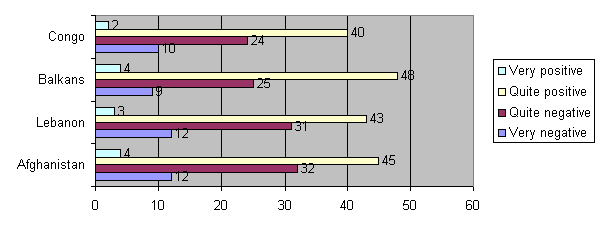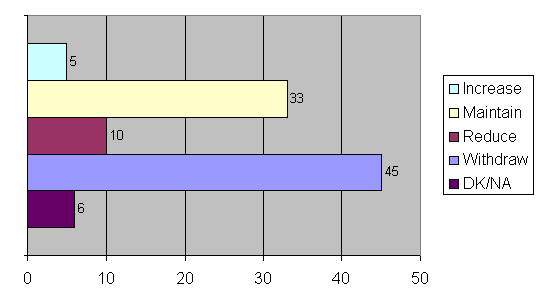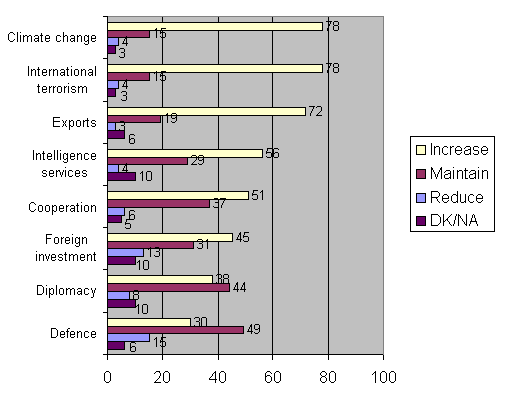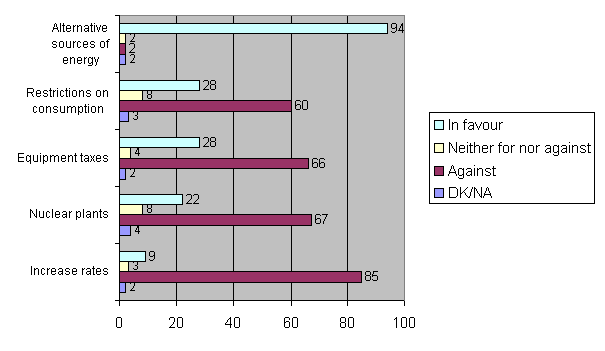FOURTEENTH EDITION OF THE BAROMETER OF THE ELCANO ROYAL INSTITUTE (March 2007)
Press Summary
FAVOURABLE OPINION OF MERKEL AND ROYAL
- Spain’s pro-European attitude is unsinkable. Fifty-three percent continue to say they are in favour of the EU Constitutional Treaty, versus 8% who oppose it. The problems that have arisen in the ratification process in France and Holland, and the resulting institutional debate, have not affected Spanish opinion. In fact, 89% of those who voted in favour say they would do so again.
| % | VOTER INTENTION | ||||
| In favour | Against | Spoiled ballot | Abstention | ||
| PAST VOTE | In favour | 89 | 2 | 1 | 2 |
| Against | 3 | 85 | 1 | 4 | |
| Spoiled ballot | 4 | 1 | 71 | 4 | |
| Abstention | 19 | 6 | 31 | 51 |
Percentages in rows.
- After Kofi Annan was replaced as UN leader by Ban Ki-moon –a stranger for at least 60% of Spaniards–, Angela Merkel became the international leader seen in the most favourable light by the Spanish. Her ranking rose half a point on a scale of 0 to 10, from 5.5 to 6.1, putting her ahead even of Javier Solana, who on this occasion was given a 6.
- Also, 55% of respondents had a positive opinion of the German presidency of the EU, compared with only 9% whose opinion of it was negative.
- Germany’s image is also positive on the whole. Seventy-six percent believe it is an essential EU country, and 35% agree that its influence in the EU has increased in recent times; however, only 20% fear the spectre of Nazism and believe that ‘if Germany’s power continues to grow in the 21st century, it could once again become a threat, as in the 20th century’.
- All in all, 53% of Spaniards think that Germany has too much power in the EU; and they also think this is true of France. By contrast, 68% do not think that the latter is ‘a military power capable of counterbalancing US power in the world.’
- Regarding the immediate future of France, based on equal familiarity with Royal and Sarkozy (half of Spaniards), the former received a score of 5.7, while the latter was given 4.9 by Spanish respondents.
- On this matter, there are significant differences between the genders: women gave a higher score to Ségolène Royal.
SPAIN CONSIDERS A NEW COLD WAR
- On the subject of European defence, given the fact that the US is able to deploy missiles in Europe and that Russia is threatening to build missiles in response, 54% of Spaniards ‘believe it is possible that a situation similar to the Cold War could develop again’.
- With this in mind, 68% of respondents do not favour alignment with either of the two countries, versus 17% who would be in favour of joining a hypothetical US bloc; only 3% would support Spain aligning itself with Russia.
- Non-alignment is consistent with the past, but also with the perception of the present. Only 24% feel that the US is a positive influence in the world –the same percentage as for Russia–. This makes Spain one of the developed countries most critical of both powers; however, Iran receives still more criticism.
- The opinion of Iran is not surprising in light of other facts. The percentage of Spaniards who are very concerned about the development of nuclear arms in Iran has increased significantly since December 2006, from 45% to 58%.
- This change makes Iran the second-biggest international concern for Spaniards, at the same level as international terrorism.
THE THREAT OF INTERNATIONAL TERRORISM CONTINUES TO INCREASE
- Most Spanish respondents (43%) put the threat of international terrorism at the same level as ETA terrorism, while in December 2006, before the attack in BarajasAirport, this opinion was shared by only 20%.
- Sixty-one percent believe that the March 11 trials could lead to attacks against Spanish interests in Muslim countries.
- As a result of this feeling of threat, 78% say that public spending on the fight against international terrorism should be increased.
- It is important to emphasise that the Spanish differentiate clearly between Islamist terrorism and Islam itself, and between moral and religious content; they are more tolerant regarding the latter than the former.
- Sixty-one percent of Spaniards are against Muslim girls wearing a veil at school, versus 18% who are in favour. However, an identical percentage is in favour (40%) and against (40%) Muslims being able to use the Córdoba mosque (a Christian cathedral since the 13th century) as Roman Catholics do.
- There is reason to suppose that ‘islamophobia’ is not common in Spain, that is, intolerance to a particular religion –in this case Islam–; rather, there is a growing secularism that affects all religions, since only 46% are clearly in favour of Catholic crucifixes being displayed in schools.
- Along these same lines, only 25% oppose Muslim residents in Spain being able to vote in municipal elections.
- As a result, the fear of radical Islam has not led to a rejection of Islam as a whole. Terrorism is not so much attributed to ideological factors as to international politics. Sixty-five percent believe that the threat of international terrorism in the world is greater than before the invasion of Afghanistan –59% say this is true for Spain in particular–.
GROWING DANGER FOR SPANISH TROOPS IN AFGHANISTAN
- The negative news coming from Afghanistan, in particular that of the death of a female Spanish soldier, have had an impact on public opinion: 69% think the situation has worsened in recent months.
- Regarding the future, the majority think it will worsen (50%), while only 20% are optimistic. As a result, the percentage of Spaniards who consider it ‘very dangerous’ has risen from 34% to 46% since December 2006, so that 9 out of 10 respondents see danger.
- While in December 2006, 60% had a positive opinion of the mission, this percentage has now dropped to 49%.
- Overall, only 45% of respondents agree with a total withdrawal of troops, versus 49% who say they should continue in Afghanistan; only 4% support an increase in the contingent and the greatest percentage (34%) believe that Spain’s presence should be maintained at current levels.
- In line with the arguments defended by their respective political leaders, the most support for withdrawal is found among those who voted for the left-wing IU and for nationalist parties, while an increasing number of PP (Popular Party) voters support keeping troop levels the same or raising them. PSOE (Socialist Party) voters want them to remain the same or be reduced.
- The refusal to increase the troop contingent is the result of a perception of danger, but also of a deep-set feature of the Spanish attitude to foreign policy: pacifism. Spanish respondents agree with increasing all areas of international action, from diplomacy to foreign investment incentives to intelligence services –absolutely all areas except military and defence spending–.
INCREASING CONCERN REGARDING CLIMATE CHANGE
- Eighty-six percent agree that public spending should be increased to fight against climate change. This is a result of a significant increase in concern regarding global warming. The percentage of Spaniards who consider it a very significant threat to Spain has risen from 60% to 70% since the Paris meeting, the publication of the UN report, the 5-minute blackout, etc.
- However, 85% are against an increase in electricity rates, gas prices, etc.; 66% oppose tax increases and 62% are against restrictions on consumption.
- Ninety-two percent are in favour of developing alternative sources of energy. Only 21% are in favour of building more nuclear power plants to reduce dependence on foreign energy supplies.


